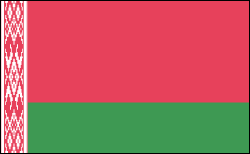Belarus News & Current Events


Relationship With Russia Is Tested
Despite the close ties of Russia and Belarus, the two countries clashed over imported Russian gas in early 2007. In Dec. 2006, Russia doubled the price of gas it exported to Belarus, and then imposed a large duty on oil exports. In response, Belarus imposed a tax on Russian gas in Jan. 2007. Russia then shut off an oil export pipeline to Europe (which spelled trouble for Europe, since half of all European exports of Russian gas are transported through Belarus). By mid-January, Russia agreed to cut its oil duty and Belarus agreed to cut its tax.
In September 2008, President Alyaksandr Lukashenka won all 110 seats in parliamentary elections, but European monitors criticized the flawed counting system in Belarus.
Lukashenka's Reelection Causes Protest and Controversy
On December 19, 2010, Alyaksandr Lukashenka, president since 1994, was reelected. According to government officials, he won by 79.7% of the vote. Andrey Sannikau was his closest challenger with 2.6% and voter turnout was 90.7%. On the day of the election, two presidential candidates were beaten by police while attending different opposition rallies. One of the candidates, Uladzimir Niaklajeu, was taken to a hospital where he was treated for a head injury. While in intensive care, he was abducted by Belarusian authorities. On the night of the election, ten thousand opposition protesters attempted to storm the government building of Belarus, smashing windows before police pushed them back.
On December 27, 2010, Prime Minister Syarhey Sidorski and his cabinet resigned. The next day, Lukashenka named Mikhail Myasnikovich as prime minister. The European Union along with the United States imposed sanctions on Belarus officials after the election and promised aid to opposition groups seeking to oust Lukashenka. Lukashenka has been referred to as Europe's last dictator.
In April 2011, a bomb exploded in a subway station next to Lukashenka's office. The explosion killed 12 people, wounded 150 others and strained an already tense political situation. No one claimed responsibility for the bomb. Lukashenka reported two days later that two suspects had confessed to the crime, but no other details were given.
Russia Bails Out Belarus
In June 2011, Russia agreed to loan Belarus $3 billion, which will be disbursed over three years. In exchange for the loan, Russian officials demanded that Belarus sell its factories to Russian companies, thus privatizing much of its state-owned industries. More money came in November when Russia agreed on a gas deal that gave Belarus more than $14 billion in loans and discounts on natural gas. In return, Belarus gave full control of Yamal-Europe, its natural gas pipeline, which runs to Europe, to Gazprom, a Russian energy company. Russian Prime Minister Vladimir Putin said that the deal and Gazprom's control of the pipeline from Siberia to the border of Poland will "ease relations with Belarus for years to come."
Lukashenka's Government Continues to Hold Sway Despite EU Sanctions
In March 2012, members of the European Union removed their ambassadors from Belarus and imposed a ban on travel for the country's top officials. In retaliation, Lukashenka barred several political opponents, journalists and human rights workers from leaving Belarus.
September's parliamentary elections held no surprises as seats were once again filled by Lukashenka supporters. International observers condemned the vote, which was called undemocratic and non-competitive. Opposition parties the United Civil Party and the Belarusian Popular Front both boycotted the election and encouraged voters not to vote. The Central Elections Commission chairman claimed a 74.3% voter turnout, while local independent observers estimated a number closer to 19%.
See also Encyclopedia: Belarus .
U.S. State Dept. Country Notes: Belarus
Ministry of Statistics and Analysis president.gov.by/Minstat/en/main.html .







